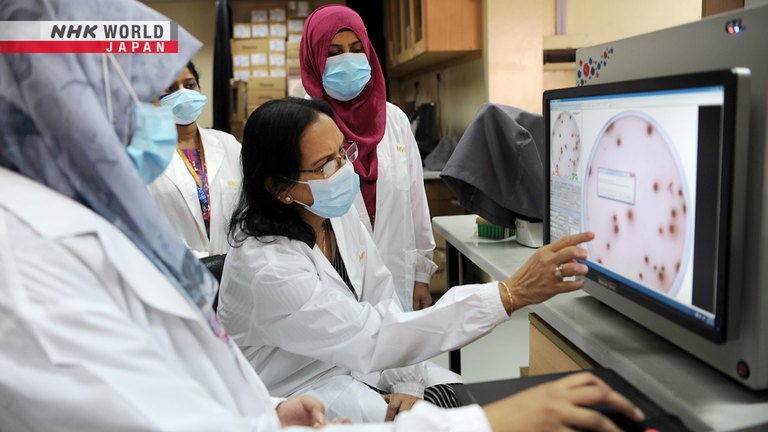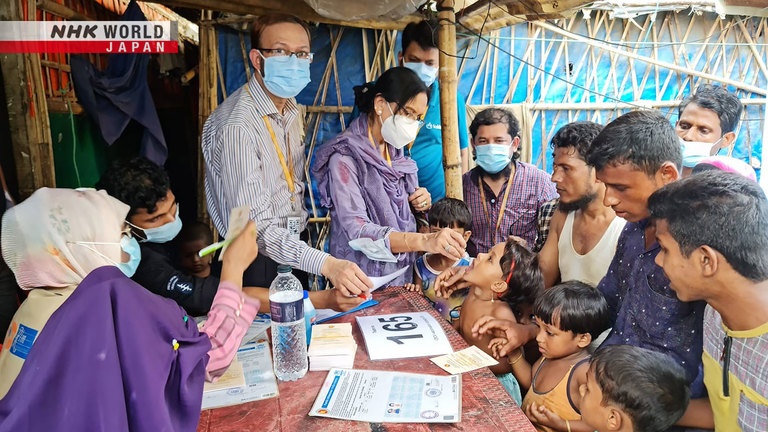Steady Effort Saves Lives: Firdausi Qadri / Vaccine Scientist
Dr. Firdausi Qadri is a Bangladeshi scientist specializing in infectious diseases such as cholera. In 2021 she was awarded the Ramon Magsaysay Award, the Asian Nobel Prize, for her work.



Transcript
Direct Talk
Bangladesh is one of the countries
in South Asia that's still suffering
from cholera and other infectious diseases.
Dr. Firdausi Qadri is an Emeritus Scientist
at the International Centre for
Diarrhoeal Disease Research, Bangladesh
or icddr,b.
She is helping to reduce
the number of cholera victims.
She has introduced
a cheaper oral cholera vaccine
and works closely with the country's
government on infectious disease control.
She has also succeeded in reducing victims
and prevented the spread of cholera
in the Rohingya Refugee Camps since 2017.
Her work involves helping to prevent
infectious diseases not only in Bangladesh
but also in developing countries
in Asia and Africa.
In recognition of her achievements,
she was awarded the
Ramon Magsaysay Award in 2021,
known as Asia's Nobel Prize.
Through her research, she hopes to solve
Bangladesh's long-standing cholera epidemic
and save as many lives as possible.
Steady Effort Save Lives
Cholera is called a disease of poverty.
That's why many countries
don't want to admit that they have it.
It can affect issues including food exports,
transportation and migrant workers.
That is why we don't want to
talk about cholera.
In Bangladesh, there are
about 100,000 cases of cholera
and approximately 4,500 deaths every year
I was born in Bangladesh.
Since my childhood,
I've seen misery and disease.
I realized that
I needed to work in public health
to contribute to my country and myself.
Dr. Qadri completed
her doctorate in biochemistry
at Liverpool University in the U.K.
She joined the icddr,b
as an associate scientist in 1988.
She was later appointed as a senior scientist
at the Department of
Mucosal Immunology and Vaccinology there.
Her research focuses on infectious diseases,
immunology,
vaccine development
and clinical trials.
When I started out,
I only worked in the lab as a scientist.
But about 15 years ago,
I started to realize that would not allow me
to make a real contribution.
By just doing research into cholera
and other vaccines,
I couldn't help the common people.
And if I couldn't use the results
of my research to help the poor,
my lifetime of work
would have been a failure.
That's why I chose fieldwork
as well as research which is still important.
Dr. Qadri began her field research,
focusing on slums.
Many people who lived in
those densely packed unsanitary areas
were constantly threatened
by the spread of cholera.
In Bangladesh, epidemics and outbreaks
have occurred two times so far.
Whenever there's a cyclone or flooding,
cholera breaks out in a new form.
It occurs any time
there's an unprecedented emergency.
There are two main factors:
drinking contaminated water
and limited knowledge of
sanitation and personal hygiene,
especially among people who are poor,
uneducated
and living in the slums.
So diseases like cholera are
prevalent mostly in these areas.
Many households often share a single toilet.
Moreover, there are no flush toilets,
no showers or flushing functions.
This lack of sanitation creates
such a situation where cholera can spread.
Water, sanitation and hygiene
are also important
to prevent cholera.
Water is scarce.
Everything gets contaminated
due to the scarcity of water.
People can't wash
their cooking utensils adequately.
So ensuring a supply of clean water
is a very important step.
For Dr. Qadri, it has been
a long-held dream to have a vaccine
that is inexpensive and available
for the people of Bangladesh to purchase.
The Swedish oral cholera vaccine,
Shanchol, which was introduced in 2011,
was just that.
Dr. Qadri's many years of field research data
also contributed greatly
to the development of this vaccine.
In 2011, five years after
Shanchol was launched,
Dr. Qadri finally received support
from the Bill & Melinda Gates Foundation
to begin a large-scale study in the slums.
When I started my fieldwork, I felt hopeless
because there were no
radical measures to prevent cholera.
However, thanks to the advent of Shanchol,
we were able to gain a foothold.
With the help of the
Bill & Melinda Gates Foundation,
we were able to conduct a feasibility study
of this vaccine in slums in Dhaka,
covering 250,000 people of all ages.
As a result of Dr. Qadri's hard work,
a large part of the population there
can now get
inexpensive, effective,
and easy to obtain oral cholera vaccines
reducing the spread and decrease
the death rate caused by the disease.
However life as a female scientist
in Bangladesh has not always been easy.
Dr. Qadri also faced many problems
while doing her research.
When I worked in the lab,
my male colleagues would ask
how my family was managing.
They said they wouldn't allow
their wives to work like me.
My neighbors also used to ask me
how my children would grow up
without proper care.
And when my children did well on their exams,
they'd say how adorable they were.
Her family, especially her husband,
was a big support for her career.
My husband was a
great support at every stage,
and also the support from my mother-in-law,
who lived with us, was very strong.
When I was not at home,
my husband used to take care of the kids.
He'd manage everything.
She always dreamed of creating
a private research institute
where more young female scientists
could conduct cutting-edge research.
Winning the Christophe Merieux Prize
in France in 2012
and receiving 500,000 euros gave her
the chance to make that dream a reality.
With the understanding
and cooperation of her family,
she decided to use the prize money
to create a private institute, ideSHi.
The main purpose of ideSHi
is to develop capacity in Bangladesh.
ideSHi
Institute for Developing Science and Health Initiatives
If more young people
can get training and do research here,
they'll feel great.
And the mission of ideSHi
is to work with the health problems
that Bangladesh faces.
I want to inspire more women.
Because men and women
are fifty-fifty in our society.
So I want more women
to pursue higher education,
enter the research field,
and contribute to society.
If I encourage a woman,
I can help her entire family to change.
An educated woman with energy
can take care of her family
and treat her children well.
She is a legend
and it's like a great opportunity,
and I consider it a blessing
to work with her,
and I want to be an international scientist
and emeritus scientist like her.
In 2017, nearly one million Rohingya refugees
came to Bangladesh from Myanmar.
There was lack of space.
People lived in the overcrowded camps.
When Dr. Qadri heard about this situation,
she feared for an outbreak of cholera there.
At that time, we and DGHS
and the Ministry of Bangladesh
were thinking of administering vaccines
to prevent a major cholera outbreak
in the Rohingya Refugee Camps.
In September we wrote to the
WHO Global Task Force on Cholera Control
and requested vaccines.
It happened so quickly.
The WHO replied within two days
asking how much we needed.
Within a short time, the vaccines arrived
and were immediately sent
to the Rohingya Camps at Cox's Bazar.
The major vaccination campaign
started in October.
The vaccination campaign had the support of
EPI and many international organizations
such as WHO and Unicef
in association with icddr,b
and we have successfully run our vaccination
camp under very difficult conditions.
Since then, there have been
seven big campaigns
and we've been able to control cholera
among those populations.
As a 1st step of the
National cholera control Plan of Bangladesh,
Dr. Qadri led a
large-scale vaccination campaign
in six high-risk areas of Dhaka city in 2020,
and vaccinated about
1.2 million people with the 1st dose.
Soon, however,
an outbreak of the corona virus
forced Dr. Qadri to take action.
And she was forced to suspend plans
for a second dose of the cholera vaccine.
After our 1st dose of cholera vaccine,
the Covid-19 pandemic hit
and put a halt to
our National Cholera Control Plan.
We haven't been able to continue
the vaccination campaign
or administer the 2nd dose.
The country had to set up
a new strategy for the Covid-19 vaccine.
We're all working on that as well.
She is now planning to restart the campaign
to have the second dose
of cholera vaccines available.
We are thinking about resuming
the National Cholera Control Plan.
We're deciding where to work
in Dhaka city and elsewhere.
So we have to put new energy and effort into
restarting cholera vaccinations
along with covid vaccinations.
In 2021, she was awarded the Ramon
Magsaysay Award for her work on cholera.
However, she lost her beloved husband
a day after she had received the award.
Despite this major personal tragedy,
her fight against cholera continues.
Firdausi Qadri
Vaccine Scientist
Now our plan in Bangladesh
under the National Cholera Control Plan
is to free the city of Dhaka from cholera,
vaccinate all the people,
and improve hand washing,
water quality, and sanitation.
The cholera vaccine has made it
possible for children in Bangladesh
to live better lives.
We can see a path forward,
step by step, to a more developed country.
But we still need to import
most of the vaccines from other countries.
We have to produce
our own vaccines ourselves.
As soon as we can do that
it will be much better for us.
My life's motto has been,
"Seek and you shall find."
And I believe that "life is good."
I believe that you must choose
one thing that you want to do well
and you must first find
that calling in yourself.
And you must also think of a thing
that is important for yourself,
for your life,
for your family, but also for your country.
I believe that only research
can help us go forward.
Research and research and research.
And that is what I've been doing for 50 years,
and I will go on as long as I'm alive.